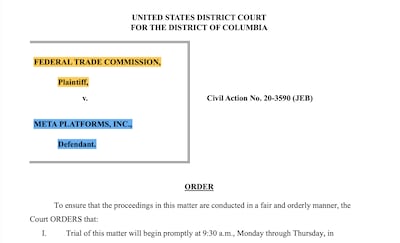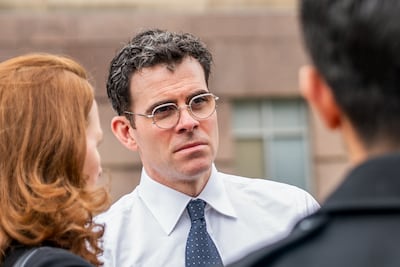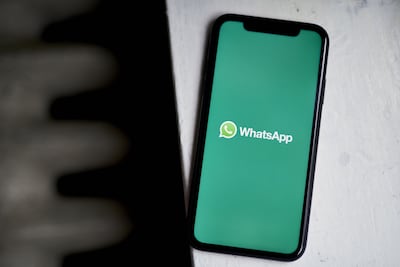Move over TikTok – it's now the turn of social media company Meta, owner of Facebook, Instagram and WhatsApp, to face off against US regulators in court.
The case, filed by the Federal Trade Commission, accuses Meta of unfairly blocked social media alternatives from making inroads, and it has the potential to force the California-based company to divest from Instagram and WhatsApp.
“Rather than outcompeting its rivals on the merits of its personal social networking offering (Facebook), Meta chose to protect its position through anti-competitive means,” reads the FTC's pretrial brief, filed on Wednesday.

That pretrial brief accused Meta of “buying out the significant threats” such as the popular photo-sharing app Instagram, and later the messaging app WhatsApp to preserve its dominance.
“By eliminating competitive threats through acquisitions, Meta plainly 'foreclosed competition on the merits,' and thus maintained its monopoly through competitive means,” it reads.
The trial, which begins on Monday in Washington, has been more than two years in the making, and has its roots in President Donald Trump's first administration, when members of Congress from both sides of the aisle began to cast a more critical eye on Meta.
Meta used every tool at its disposal to prevent the case from proceeding through to litigation.

In 2024, Meta attempted to blunt the impact of the trial by filing what's known as a motion for a summary judgment, which would have protected the company to a large extent from any litigious fallout.
“Meta faces fierce competition from a range of platforms – from TikTok and X to YouTube and Snapchat,” read the court filing, pointing out the alternatives users have to Meta's social media offerings.
It also accuses the FTC and regulators of being hypocritical given the historical timeline of Meta's acquisitions.
“The FTC reviewed both acquisitions years ago and allowed them to close,” Meta wrote. “The decision to revisit done deals is tantamount to announcing that no sale will ever be final.”

The high-stakes trial will not involve a jury. Instead, US district judge James Boasberg will decide what, if any, consequences Meta might face.
The big question the FTC will have to prove, is that through Meta's actions over the last decade, have consumers been hurt and suffered as a result?
Mark MacCarthy, a senior fellow at the Institute for Technology Law and Policy at Georgetown University in Washington, said that the results of an FTC victory would level the playing field to an extent, but it wouldn't be the silver bullet sought be regulators.
“Spinning off Instagram and WhatsApp might help advertisers some,” he said, noting that Meta currently controls a significant amount of power in terms of setting advertising rates.
“It won’t improve privacy for consumers or reduce information disorder,” Prof MacCarthy added, noting the ample concerns and accusations made against Meta in recent years, especially with the company recently eliminating its independent fact-check system for content.
Prof MacCarthy pointed to a previous essay he wrote on the FTC's case against Meta, warning that independent Instagram and WhatsApp platforms would eventually start displaying the same characteristics that became the target of regulators with Meta.

“Each of these companies will rapidly rebuild their user profiles with new data and continue their efforts to exploit this data to personalise services and advertising,” he said.
He said that ultimately, if the FTC wants to see greater consumer empowerment it seeks with the Meta litigation, it will take an all-hands-on-deck approach from several federal agencies, including the Federal Communications Commission.
Meanwhile, as the clock ticks down, there's some speculation that Mr Trump might urge federal agencies to settle out of court with Meta.
That speculation has been largely fuelled by Meta and its founder, Mark Zuckerberg, making several changes to the platform in recent months, in an apparent bid to appease the Trump administration.
Mr Zuckerberg also appeared at Mr Trump's inauguration, several months after saying that his company regretted working so closely with president Joe Biden's administration on monitoring misinformation during the Covid-19 crisis.
So far, however, those hopes from the Meta team that Mr Trump might intervene have not come to fruition.
Even if the FTC fails in court, the trial, which could take months, might prove to be a huge drain on Meta's resources, potentially distracting the company and its staffers from the fast-moving technology landscape where companies quickly come and go.
“Put simply, antitrust laws are supposed to promote competition and protect consumers, not punish companies for innovating to give people greater value and choice,” Meta said during a 2024 court filing.
“We will continue to vigorously defend our company and the ability of people and businesses to choose the great products we offer.”


